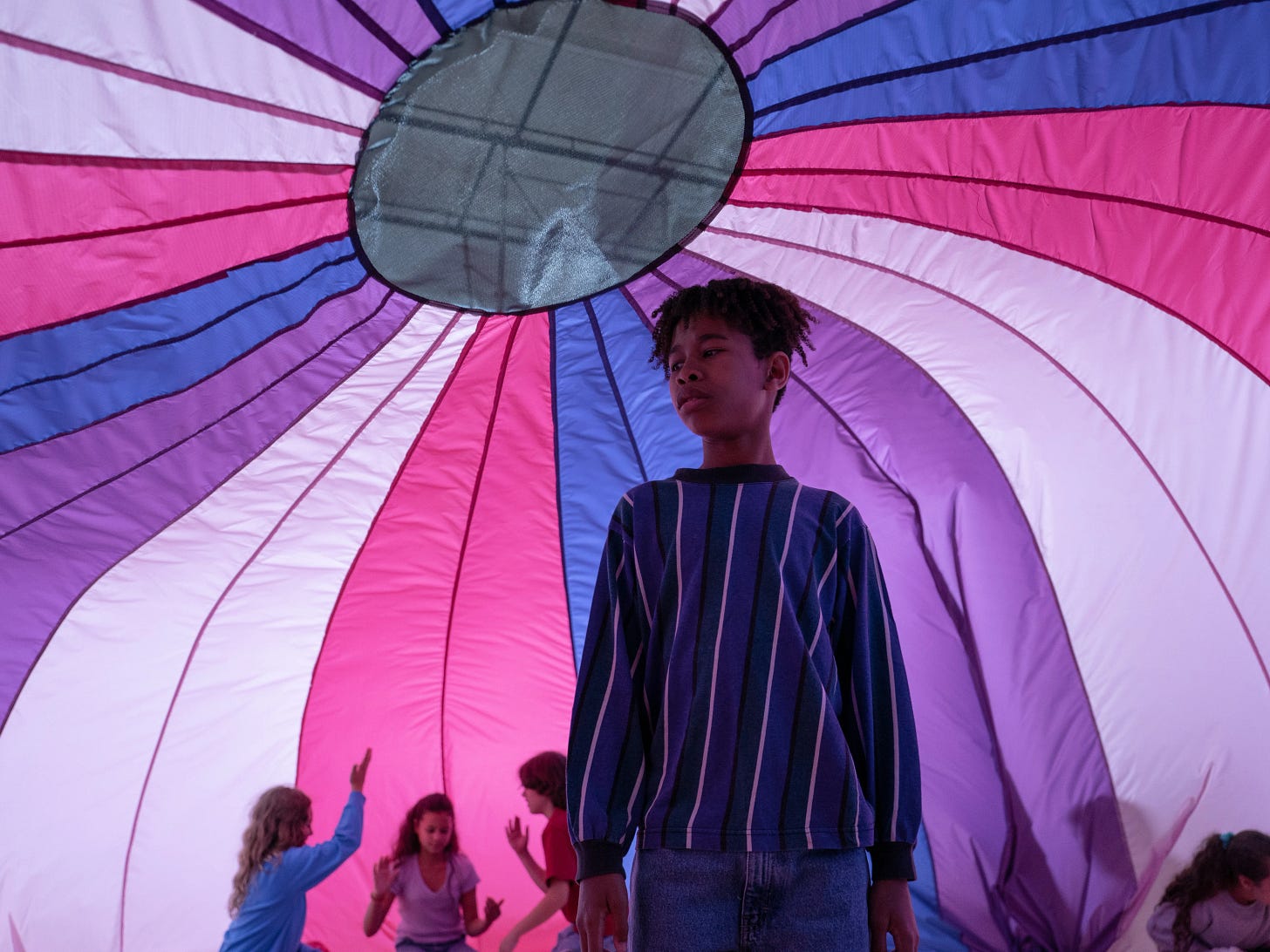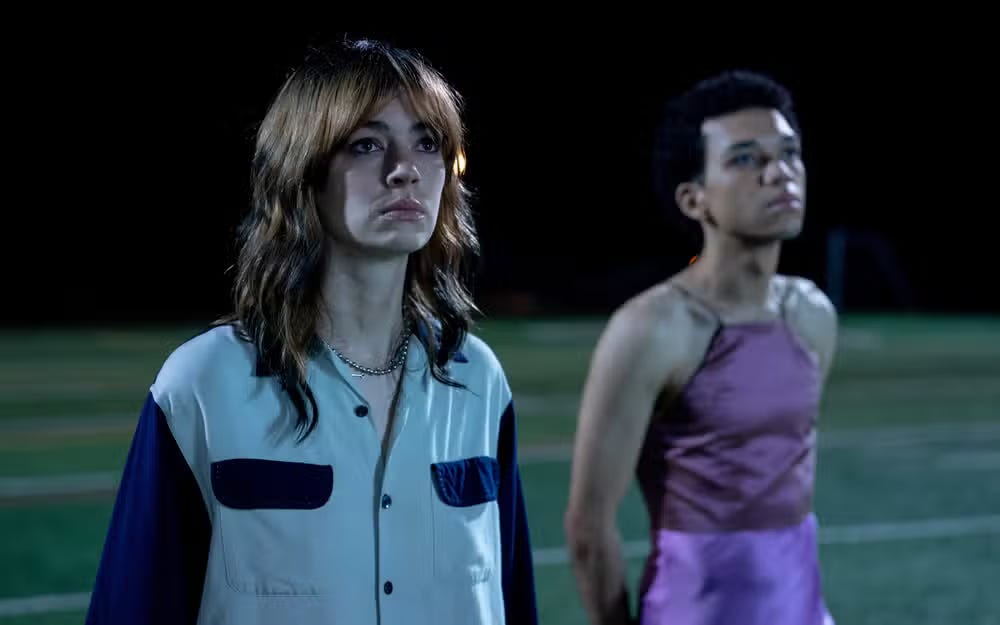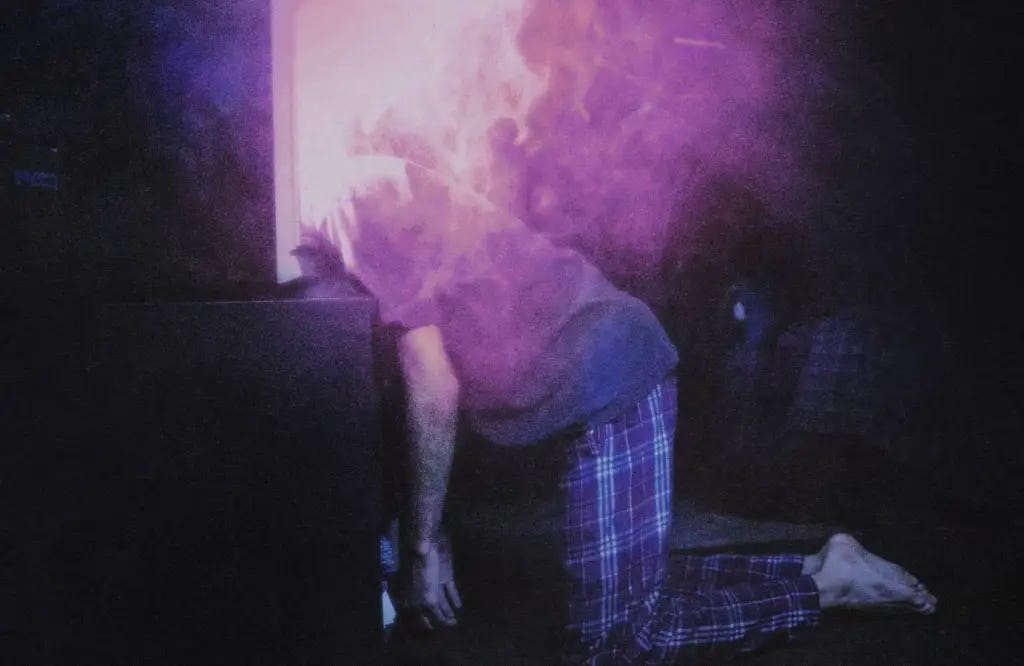Black Faces White Writers
Why "diverse" color blind casting can do more harm than good...I think.
I recently watched a film called “I Saw The TV Glow”…
by Jane Schoenbrun and, cutting straight to the chase, I did not like it, despite having a character who looked like me, played by fellow light bright enby Justice Smith (who was great in The Getdown, Dungeons and Dragons, and that Pikachu movie, but was also in that terrible looking Magical Negro movie), and despite depicting experiences, at least visually, that I could relate to, the film was clearly not for me. And that is ok. But it felt really off to me for a few reasons. Now before I jump into it, I don’t want to bash what is essentially a trans coming of age film; I don’t want to add fuel to what is already a very transphobic world. However, the film is clearly made through a white gaze that, if I’m being honest, seemed to benefit from having a black, albeit light bright lead, without adding any actual color to the script. And this is a problem I have with a lot of “inclusive” and “diverse” elements of media, but I’ll get to that.
The film depicts a young lightskin black “boy” in the suburbs, in the 90’s, with one black and one white parent. Wow, ok, me. The kid is awkward, quiet, stoic, and into a “girl show” that he feels guilty or perhaps is made to feel guilty for watching. Ok very relatable. The scene depicting Owen trying on a pink dress at a femme friends house was also very fucking relatable. And he has asthma! I thought maybe the writer had followed me around as a kid or plucked these scenarios straight from my memory bank. And let’s be honest; colorism and misogynoir are prevalent in American stories, but seeing an actual mulatto kid with a white and black parent depicted realistically in film is pretty rare (these are not lightskin tears! It’s just true! This can be true concurrently with the fact that dark skin black people are constantly fucked over in Hollywood and in stories in general). And, as a huge nerd and pseudo latchkey kid, I could also identify with the themes of fandom, and learning about oneself through television and media (though for me it was anime).
Despite this, I really didn’t like this film. For a number of reasons. First, it’s just so white. I mean, it’s 2024 and I think there are more important things an upper middle class white Jewish person can be talking about when Black and Brown people are being murdered here in America everyday, especially trans women of color, as well as in Palestine and Congo and now Lebanon. Do you think there are no queer people there?
But really what bothered me is that I was baited into thinking I would be represented in some real way, only to realize this was a white story written by a white person, who then cast a talented Black actor, without actually making the character Black. Obviously, blackness is not a monolith, and I’m not criticizing the actor for not “being black enough” or even the character for not liking “black things” or behaving in a “black way”. Owen was simply not a Black character at all. The character could have been played by a white actor and nothing would have changed in the story whatsoever. Now not every movie can be racially progressive, obviously, and I enjoy my share of banal and ethnically ignorant media. But A24 be acting like it’s the independent woke genius film farm, and so obviously I’m gonna hold it, and the film, to the standard of an independent woke genius film. And sure, maybe I was naive for thinking this might be some nerdy version Moonlight (also A24). I didn’t really know anything about this film, who wrote it, or what it was about, going into it. But it was clear to me early on in the film that we have a clearly queer story positioning itself as a boundary breaking piece of film that speaks to THE trans identity, that then falls flat on it’s face despite setting itself up for a potentially poignant story about gender, race, socioeconomic standing, etc.
And before you start saying shit like “well the movie isn’t about that”; it doesn’t have to be about that to touch on it with a genuine concern for it. Although I actually disagree that the film isn’t “about that”. The film certainly depicted a white upper class trans experience, but benefitted from having a black actor while operating in a realm of woke identity politics. It’s 2024 and I think we need to move beyond inclusion as “diversity”, and move towards “realistic depiction” as actual inclusion. Not just including black and brown people in stories, but actually caring to write realistic and whole black characters, even if your story is white as fuck.
The main character Own, cast as a black person, Justice Smith, has a whole nother level of trauma and alienation that is just ignored, especially considering the character lost their Black mother and was left to live with their abusive white father, amongst white people, in a very white suburb, in a time before the internet was the communication hub that it is today. Racial violence from parents is a particular sin that deserves attention. The “fly in the milk” scenario, while definitely leading to problematic cringeworthy behaviors at times, is a trauma that deserves attention. The particular hypermasculinization of black boys, who maybe just want to play with dolls and watch Sailor Moon (or in this case The Pink Opaque) deserves attention.
But in “I Saw the TV Glow” these themes are totally ignored. As if the characters live in a world where racism does not exist.
All that being said, there were a few things I liked about the film. The surreal elements were interesting to me. The low budget costumes were interesting to me. The neuro-divergent urge to LIVE inside your favorite show was, as I said, relatable, and there was a lot of cool lighting. King Woman’s performance was awesome, and honestly, if the film had more of that rage, more of that indomitable spirit in the face of tyranny type attitude, I might have enjoyed it a bit more despite all the shit that I said above. But really, it felt slow, and meandering, and honestly racist in its treatment of its Black lead. Aside from the fact that I want to see Black actors getting work, I would have preferred Owen just be white so that I wasn’t tricked into watching a slow and drawn out indie rock music video.
It’s also worth noting that while violence is hinted at happening to the young White girl, the only actual violence we see is enacted on Owen, on a Black body. One scene depicts a rather disturbing episode of violence from his White father, and another scene depicts him violently assaulting himself. The metaphor might have been a sort of “shedding the fake persona to see the beauty inside” type of deal, but still. My wife used the term punching bag, and I have to agree that Owen was a sort of Black boy punching bag.
Just sayin.
The ending depicted a depressed, sickly Owen, dissatisfied with their hetero-normative life to the point of self mutilation, in the midst of an asthma attack at the children’s arcade they’d worked at for decades. I’m too lazy to look up the quote but I’m pretty sure Schoenbrun mentioned in an interview that the ending was meant to be “humorous”... Again, I really think if the main character would have been white, it would have been more “humorous”. I think Schoenbrun meant to say that the main character did this to themself, and that this was a potential “ugly” life that Schoenbrun herself avoided. But I can’t shake the horror of seeing another Black person, potentially trans person, suffering at the hands of White patriarchy and I certainly wouldn’t call that humorous. And beyond that, even outside of Owen being cast Black, it seems a little judgy to laugh at someone who hasn’t felt safe enough to come out of the closet and now suffers in silence. It’s not like Owen chose some hyper masculine identity to try and hide themself, or even perpetuated more violence or something. Owen chose to work at an arcade with kids, ostensibly a way to keep their own inner child alive, despite the crushing reality of the choices that led to what appears to be a very unsatisfying life.
Color blind casting was a reasonable response to the changing landscape of America and Hollywood once upon a time, and the “progress” being made towards a post racial utopian society in which racism doesn’t exist and everyone loves each other (yeah right). But I really think it can do more harm than good. Again, I’m glad my brotha’s and sista’s are gettin’ paid. It’s up to these white directors, White actors, White casters, who have the honor and benefit of working with Black artists, to go a few steps further, and consider how a character being Black actually changes the narrative, actually changes the experiences of the character. Cus otherwise we just gon end up with more quasi-progressive, liberal, White-washed bullshit that might as well have just used white bodies.







